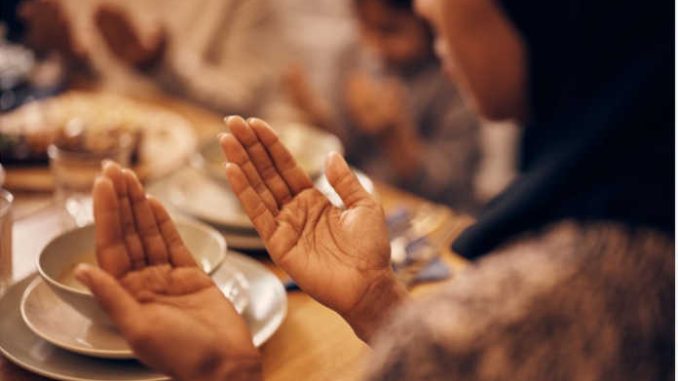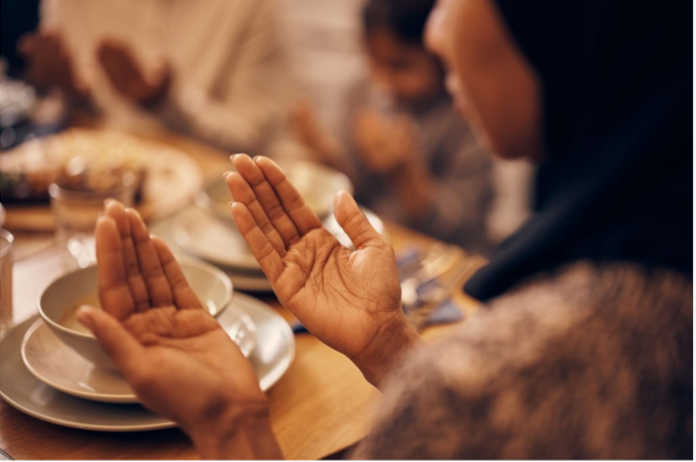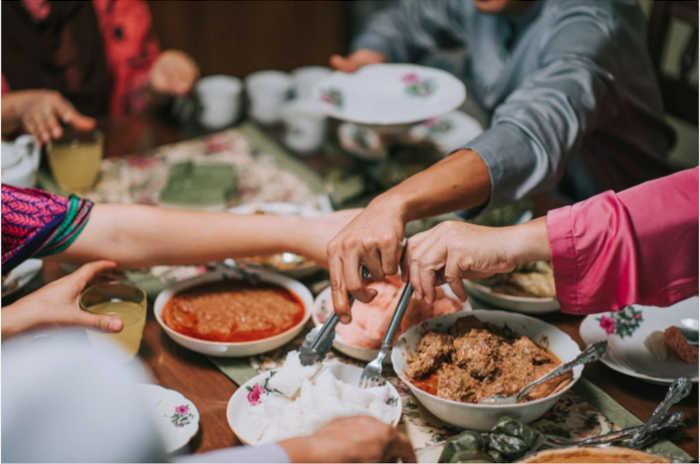
Eid al-Fitr festival, also known as the Festival of Breaking the Fast, is a joyous occasion that marks the end of the holy month of Ramadan. This religious holiday is celebrated by Muslims worldwide, but each country has its unique customs and traditions to commemorate the occasion. One such country is Morocco, where the celebration of Eid al-Fitr is a grand affair, steeped in history, culture, and culinary delights.
In Morocco, the celebration of Eid al-Fitr is a time of great rejoicing and merrymaking, as families and friends come together to celebrate this joyous occasion. From the traditional prayers in the morning to the festive feasts in the afternoon and the exchange of gifts and greetings, the festival is a time of happiness and togetherness.

But perhaps the most exciting part of the Eid al-Fitr celebrations in Morocco is the food. Moroccan cuisine is renowned for its bold flavors and vibrant colors, and during Eid al-Fitr, the tables are filled with a variety of sweet and savory dishes that are a feast for the senses.
Join me on a journey through the rich and colorful Eid al-Fitr celebrations in Morocco, as we explore the culture, tradition, and, of course, the food that makes this festival so special.
Origins and Significance of Eid al-Fitr in Moroccan Culture
The origins of Eid al-Fitr in Moroccan culture can be traced back to the Islamic conquest of Morocco in the 7th century. Islam was introduced to Morocco by Arab and Berber conquerors, who brought with them their customs and traditions, including the celebration of Eid al-Fitr. Over time, the festival became an integral part of Moroccan culture and is celebrated with great enthusiasm and zeal.
Eid al-Fitr is a time for forgiveness, generosity, and celebration. It is a time to reflect on the blessings that have been bestowed upon us and to give thanks to Allah for his mercy and grace. During this festival, Muslims all over the world gather with family and friends to share food, exchange gifts, and offer prayers. In Morocco, the festival is celebrated with great pomp and show, and people dress up in their finest clothes and adorn their homes with colorful decorations.
One of the most significant aspects of Eid al-Fitr in Moroccan culture is the tradition of giving gifts. It is customary to give gifts to family members, friends, and even strangers during the festival. The act of giving gifts is a way to show gratitude and appreciation for the blessings that have been bestowed upon us. In addition to gifts, it is also customary to donate to the less fortunate during Eid al-Fitr. This act of charity is an important part of the festival and reflects the values of compassion and kindness that are central to Islamic teachings.
Another important aspect of Eid al-Fitr festival in Moroccan culture is the tradition of feasting. After a month of fasting, Muslims break their fast with a special meal called “iftar” on the night of Eid. The meal typically consists of traditional Moroccan dishes such as tagine, couscous, and pastries. In addition to the iftar meal, families and friends gather together to share a festive feast, which often includes roasted lamb, rice, and other delicacies.
Eid al-Fitr is also a time for prayer and reflection. Muslims attend special prayers at mosques and recite special prayers of gratitude and thanksgiving. The prayers are an important part of the festival and serve as a reminder of the spiritual significance of Eid al-Fitr.
Eid al-Fitr is an important cultural event in Morocco that is celebrated with great enthusiasm and zeal. The festival is a time for forgiveness, generosity, and celebration, and is marked by traditions such as gift-giving, feasting, and prayer. Eid al-Fitr is a testament to the rich cultural heritage of Morocco and reflects the values of compassion, kindness, and gratitude that are central to Islamic teachings.
Preparations and Festivities for Eid al-Fitr in Morocco
Now that we’ve understood the origins of the Eid al-Fitr, let us take a closer look on the preparations and festivities marking this celebration in Morocco
In Morocco, preparations for Eid al-Fitr begin several days before the festival, and the celebrations continue for several days after. One of the most important preparations for Eid al-Fitr in Morocco is cleaning the house. This is a time when families clean and decorate their homes with colorful lights and decorations, preparing for the arrival of guests and loved ones. Additionally, people often purchase new clothes and shoes to wear on the day of the festival.
Another important preparation for Eid al-Fitr festival is the purchase of food and sweets. Moroccan cuisine is known for its rich flavors and diverse ingredients, and during the festival, families and friends prepare traditional Moroccan dishes to share with each other. People also prepare a variety of sweets and desserts, such as sellou and chebakia, to serve as part of the festive meals.
On the day of Eid al-Fitr, people in Morocco wake up early and attend special prayers at mosques. After the prayers, families and friends gather together to share a festive meal and exchange gifts. Children often receive new clothes and toys, and people visit friends and family members to offer greetings and good wishes.
The celebrations of Eid al-Fitr in Morocco continue for several days, with people often taking time off work to spend time with their loved ones. It is a time for reflection, forgiveness, and generosity, and people often donate to charity and help those in need during the festival.
From cleaning and decorating the home to preparing traditional Moroccan foods and sweets, people in Morocco take great care to ensure that the festival is celebrated in the best possible way. It is a time to come together with loved ones, reflect on the blessings of life, and offer prayers and good wishes for the future.
Customs and Rituals Associated with Eid al-Fitr in Morocco
Morocco has its unique customs and rituals associated with the Eid al-Fitr auspicious occasion.
The Eid al-Fitr festival is an occasion for family and friends to come together and celebrate the end of the month-long fasting period. In Morocco, the celebrations start with the sighting of the new moon, which marks the beginning of Shawwal, the Islamic month following Ramadan.
One of the most significant customs associated with Eid al-Fitr in Morocco is the preparation of a special breakfast. Known as “s’ghirat al-fitr,” this meal usually consists of sweet treats, such as honey and cheese pastries, as well as dates, milk, and orange juice. Moroccan families take great pride in preparing this breakfast and sharing it with their loved ones.
Another important ritual associated with Eid al-Fitr festival in Morocco is the exchange of gifts. Children are particularly excited about this tradition, as they receive new clothes, toys, and sweets from their parents, relatives, and friends. This exchange of gifts is a symbol of love and affection and strengthens the bond between family members and friends.
Moroccans also celebrate Eid al-Fitr by visiting the graves of their loved ones. They offer prayers and recite verses from the Quran in remembrance of their departed family members. This ritual is a way to honor and pay respect to the deceased and seek blessings for the living.
In addition to these customs, Moroccans celebrate Eid al-Fitr by decorating their homes and streets with colorful lights and lanterns. They also attend special prayer services in mosques and listen to sermons by religious leaders.
These customs and rituals associated with this occasion reflect the rich cultural heritage of the country and bring people together in a spirit of joy, love, and harmony.
Read: The Legacy of the Zulu Empire: Exploring KwaZulu-Natal’s Rich History and Culture
Traditional Moroccan Foods for Eid al-Fitr Celebrations
Let us now explore some of the cuisines and dishes which are a vital aspect of the Eid al-Fitr celebrations in Morocco.

During this festival, people prepare traditional Moroccan dishes to share with family and friends. Moroccan cuisine is known for its rich flavors and diverse ingredients, making it a perfect choice for the festivities of Eid al-Fitr.
One of the most popular dishes during Eid al-Fitr festival in Morocco is couscous. Couscous is a staple food in Moroccan cuisine and is often served with vegetables and meat, such as lamb or chicken. It is a dish that is shared with family and friends and symbolizes the unity and togetherness that is central to the Eid al-Fitr festival.
Another popular dish during Eid al-Fitr in Morocco is tagine. Tagine is a slow-cooked stew that is traditionally made with meat, vegetables, and spices. It is a flavorful and aromatic dish that is perfect for sharing with loved ones during the festival.
Another traditional Moroccan dish that is often served during Eid al-Fitr is harira. Harira is a soup that is made with lentils, chickpeas, tomatoes, and spices. It is a comforting and hearty dish that is often served as a starter during the festival.
In addition to these traditional Moroccan dishes, there are also a variety of sweets and desserts that are enjoyed during Eid al-Fitr festival. One of the most popular sweets is known as “sellou,” which is a mixture of ground almonds, sesame seeds, and honey. It is a sweet and nutty treat that is often served with tea or coffee.
Finally, no Eid al-Fitr celebration in Morocco is complete without a cup of mint tea. Mint tea is a staple beverage in Moroccan culture and is often served with sweets and desserts during the festival. It is a refreshing and soothing drink that is perfect for rounding off a festive meal.
Traditional Moroccan foods play a significant role in the celebrations of Eid al-Fitr. From couscous to tagine, harira to sellou, there are a variety of dishes that are enjoyed by families and friends during the festival. These foods not only symbolize the rich culinary heritage of Morocco but also reflect the spirit of togetherness and unity that is central to the Eid al-Fitr festival.
Conclusion
Now that we have learned about the key components of Eid al-Fitr celebrations in Morocco, we have a better understanding of how these festivities compare to and differ from those observed in other Islamic regions.
Celebrating the Eid al-Fitr festival in Morocco is a journey filled with rich cultural experiences and traditions that are deeply rooted in the country’s history. The festival brings people from different regions and backgrounds together to share delicious foods, exchange gifts, and participate in various activities.
From the traditional Moroccan sweets and pastries to the beautiful henna designs, the festival is a celebration of life and family. It’s an opportunity for everyone to reconnect with their loved ones and reflect on the blessings of the past year.
Furthermore, Eid al-Fitr is not just about the physical celebrations but also the spiritual significance of the festival. It reminds us of the importance of forgiveness, gratitude, and generosity. It’s a time to forgive and forget past grievances and to extend our generosity to those in need.
As we celebrate Eid al-Fitr festival, let us cherish the memories of our past celebrations, embrace the traditions that make our culture unique, and look forward to the future with hope and optimism. As they say during the celebration: Happy Eid al-Fitr to all!